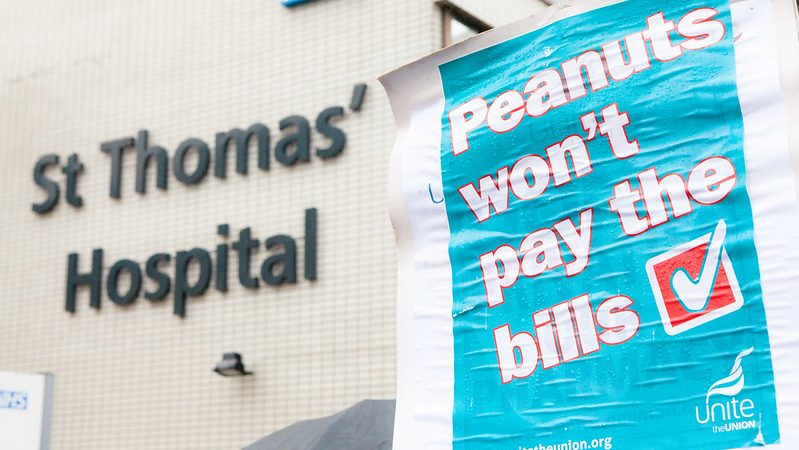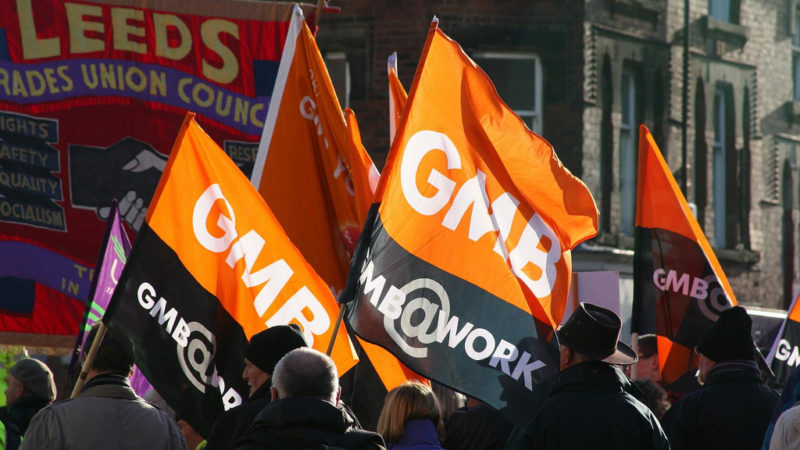“We need fighters on our side prepared to struggle, prepared to organise, prepared to think about the challenges that we face.”
The following is taken from a speech given by General Secretary of the Fire Brigades Union Matt Wrack at the eve-of-Gala rally in Durham in July.
We’ve had an election where we have driven out the spivs, the con men, and the clowns out of government, with a well-deserved eviction notice, and we should be celebrating that. I’m sure everyone had your own individual moments.
I know that firefighters had a particular dislike of Penny Mordaunt, who lied in Parliament about our pensions, with two hundred firefighters watching her in their smart uniforms, and she would not look them in the eye as she gave her comments to the House of Commons. So, we’re very pleased to see the back of her and the rest of them.
The risk for our movement, I think, is two-fold. The first one is complacency, and the second one is dismissiveness.
Complacency, because if we think the job has been done by voting Labour into office, we are making a big mistake.
There will be huge pressures put on this government to water down the legislation that we want to see in place. The job of all of us, in the friendliest way we can, by the way – I’m not talking about slagging people off – but saying in a firm, determined, organised way: you’ve been elected on the pledge of delivering on workers’ rights. Your job is now to deliver on workers’ rights, and we will be watching you every step of the way.
But there’s another risk, and that risk is dismissiveness. I understand the frustrations that people have with the Labour leadership. My union did not vote for Keir Starmer. I’ve been very forthright in a polite way about the disagreements we have with Keir Starmer on Gaza and other issues – but it would be remiss of us if we didn’t see the opportunities that open up before us with the kicking out of a Tory government and the bringing in of a Labour government which will be the first in more than a generation to start with rolling back seriously some, not enough, but some, of the anti-union legislation.
The MSL [minimum service level] for my industry is a fundamental threat to our right to operate, to our right to take industrial action, and even the repeal of that will give confidence to Fire Brigades Union members. And we can then say we’ve done that, we now need to go further, and we need to demand more.
So, it’s that risk of simply dismissing it as not going far enough, it’s been watered down. We’re talking about the Labour party here for God’s sake. It’s inevitable that there is a battle about what is delivered and what’s put in manifestos and some of us were part and parcel of that. But the question is, can we use the opportunity now to rebuild our movement? To build a movement fit for the 21st century, for the new world of work, for the millions of people who aren’t even in trade unions, who frankly don’t know what a trade union is.
That’s the task in front of us and we have to face reality hard in its face. We used to have twelve million plus people in trade unions in 1979. We now have around six million people in trade unions, with a much bigger workforce. That is a significant and historic setback, and we need to face up to it- and say we’re going to use this opportunity to rebuild organisation fit for fighting back against the employers today. And that means the Amazon workers, the Uber workers, the so-called gig economy. And some people say it can’t be done.
I always point to the example of the East London women workers in the Bryant & May factory in Bow, who were some of the most downtrodden migrant workers, young women looked down on, including by trade unionists. And yet they lit a spark. Permit the pun. They lit the spark by taking strike action. These people that people thought would never join a union. They lit a spark which, the following year, led to the dock strike and to the beginnings of mass trade unionism at the end of 19th century and into the early years of 20th century.
That’s the sort of vision we need to put before people today. You can change the world of work and think about how much time we spend in work during the course of a lifetime. We can make work better by being organised.
The miners’ strike has been mentioned. Let’s remember, that was a class offensive by the British ruling class against the most determined organised and one of the most militant sections of the trade union movement. They did it for a reason, because they wanted to send a message to the entire class. You step out of line, we will come after you, and we will destroy you, and destroy your lives, and lock you up. And we need the same level of determination in our movement as she had for her class, frankly, as Thatcher had for her class.
We need fighters on our side prepared to struggle, prepared to organise, prepared to think about the challenges that we face. And the key thing for me, the key task: rebuilding workers’ power in the workplace. That’s what we have to seize, the opportunity that this election and the platform of workers’ rights and legislation, that’s what it offers us.
Rebuild workers’ power in the workplace – that’s the challenge before all of us.

“In the wake of the election, we need to send a clear message to our newly-elected representatives: we will not accept empty promises or half measures. We demand real change, and we will not rest until we see it.”
The following is taken from a speech given by General Secretary of the Bakers, Food and Allied Workers’ Union Sarah Woolley at the eve-of-Gala rally in Durham organised by the Institute of Employment Rights and Campaign for Trade Union Freedom in July.
We are at a pivotal moment for workers’ rights in our country: after fourteen years of austerity and our rights being systematically stripped back, we have an opportunity for change.
I know there are mixed feelings around just how much change there will be under this Labour government. The election has shown us that the fight for justice and fairness in the workplace and our communities is far from over, and now more than ever, we need to unify our voices and our efforts, because seeing five Reform candidates be elected into Parliament should be much more of a concern to all of us than what Starmer is or isn’t going to do in the next one hundred days.
Our union, the Bakers Food and Allied Workers Union (BFAWU), recently conducted a comprehensive survey to understand the concerns and priorities of our members. The results highlighted the urgent need for political and economic transformation.
Whilst many would argue there is no difference in the main political parties and ask what the point is in politics, our members are actually politically engaged and determined to see change. They are not content with the status quo. The issues they face are not unique to our sector but reflect broader societal challenges. The cost-of-living crisis, which makes it difficult for families to afford basic necessities like food, energy, and housing, was, unsurpisingly, the main concern. A crisis that has been compounded by low pay, poor management practices, and insecure working conditions.
In the workplace, our members are grappling with low wages, bullying management styles, unsafe working conditions, and insufficient staffing. They are asked to do more with less, often under the strain of unsociable hours and insecure contracts.
Our survey results clearly outline what our members believe is necessary to address these challenges. Their voices have shaped the Bakers’ Dozen manifesto of 13 key demands that we will continue to advocate for tirelessly:
- £15 an Hour Minimum Wage: because every worker deserves a living wage, regardless of age. This will end the unfair youth limit on the national minimum wage.
- Abolish Zero-Hour Contracts: We demand job security and predictability for all workers- and this should be all Zero Hour contracts, because they can all be exploitative.
- Full Employment Rights from Day One: All workers should have their rights protected from the moment they start their job.
- Contractual Sick Pay at 100%: Employers must provide six weeks of sick pay at full wage to all workers.
- Repeal Anti-Union Legislation: Unions need the freedom to organise and advocate without restrictive laws.
- Maximum Workplace Temperature: Legislation is needed to ensure safe and comfortable working conditions.
- Accountability for Company Failures: Companies must not evade their financial responsibilities through administration loopholes.
- Public Ownership of Utilities: Water, energy, and Royal Mail should be publicly owned to curb excessive pricing and ensure fair access.
- Right to Food: A statutory right to food, free school meals, and a cap on supermarket profits are essential to combat food insecurity.
- Affordable Public Transport: Re-nationalise train companies, cap bus fares, and provide free public transport for young people aged 16-25.
- End Arms Sales to Israel: We must take a stand for human rights and justice globally.
- Abolish Tuition Fees: Education should be accessible to all, regardless of financial background, and they must bring back a new and improved version of the Union Learning Fund in England so everyone has the opportunity to upskill and develop themselves.
- Create a National Care Service: Providing dignity and care for the elderly and vulnerable is a societal duty.
These demands are not just aspirations; they are essential changes that will improve the lives of our members and the wider community. Our collective strength and solidarity are our greatest assets. We must continue to organise, educate, and mobilise to hold those in power accountable: just because they are now the Labour Party it does not mean we can rest on our laurels.
In the wake of the election, we need to send a clear message to our newly-elected representatives: we will not accept empty promises or half measures. We demand real change, and we will not rest until we see it.
Together, we can build a future where every worker is treated with dignity, respect, and fairness. We can’t rely on politicians to do that, we have to do it ourselves.
We can push out the far right and stop Reform gaining any more ground, but to do that we need to be able to do our jobs as trade unionists, have access to workers and work together across the movement, challenging their rhetoric and showing people that we are the ones who will support them, not Farage and his ilk.














